The Cambridge History of China. Vol. 13: Republican China 1912-1949, Part 2
Подождите немного. Документ загружается.

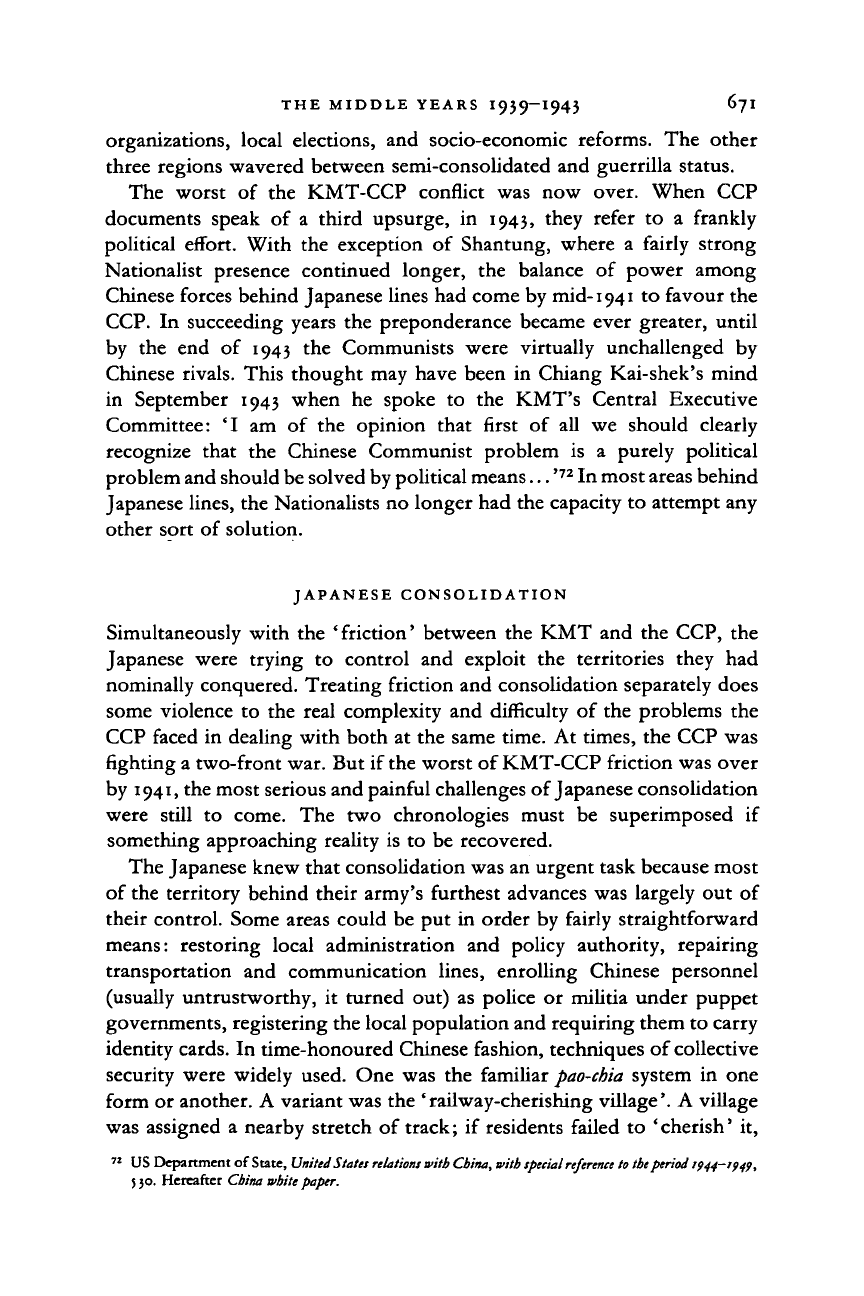
THE MIDDLE YEARS I939—1943 671
organizations, local elections, and socio-economic reforms. The other
three regions wavered between semi-consolidated and guerrilla status.
The worst of the KMT-CCP conflict was now over. When CCP
documents speak of a third upsurge, in 1943, they refer to a frankly
political effort. With the exception of Shantung, where a fairly strong
Nationalist presence continued longer, the balance of power among
Chinese forces behind Japanese lines had come by mid-1941 to favour the
CCP.
In succeeding years the preponderance became ever greater, until
by the end of 1943 the Communists were virtually unchallenged by
Chinese rivals. This thought may have been in Chiang Kai-shek's mind
in September 1943 when he spoke to the KMT's Central Executive
Committee: 'I am of the opinion that first of all we should clearly
recognize that the Chinese Communist problem is a purely political
problem and should be solved by political means...
>72
In most areas behind
Japanese lines, the Nationalists no longer had the capacity to attempt any
other sort of solution.
JAPANESE CONSOLIDATION
Simultaneously with the 'friction' between the KMT and the CCP, the
Japanese were trying to control and exploit the territories they had
nominally conquered. Treating friction and consolidation separately does
some violence to the real complexity and difficulty of the problems the
CCP faced in dealing with both at the same time. At times, the CCP was
fighting a two-front war. But if the worst of KMT-CCP friction was over
by
1941,
the most serious and painful challenges of Japanese consolidation
were still to come. The two chronologies must be superimposed if
something approaching reality is to be recovered.
The Japanese knew that consolidation was an urgent task because most
of the territory behind their army's furthest advances was largely out of
their control. Some areas could be put in order by fairly straightforward
means: restoring local administration and policy authority, repairing
transportation and communication lines, enrolling Chinese personnel
(usually untrustworthy, it turned out) as police or militia under puppet
governments, registering the local population and requiring them to carry
identity cards. In time-honoured Chinese fashion, techniques of collective
security were widely used. One was the familiar
pao-chia
system in one
form or another. A variant was the ' railway-cherishing village'. A village
was assigned a nearby stretch of track; if residents failed to ' cherish' it,
71
US Department of State, United States
relation!
with China, with special
reference
to the period 1944-1949,
530.
Hereafter China white paper.
Cambridge Histories Online © Cambridge University Press, 2008
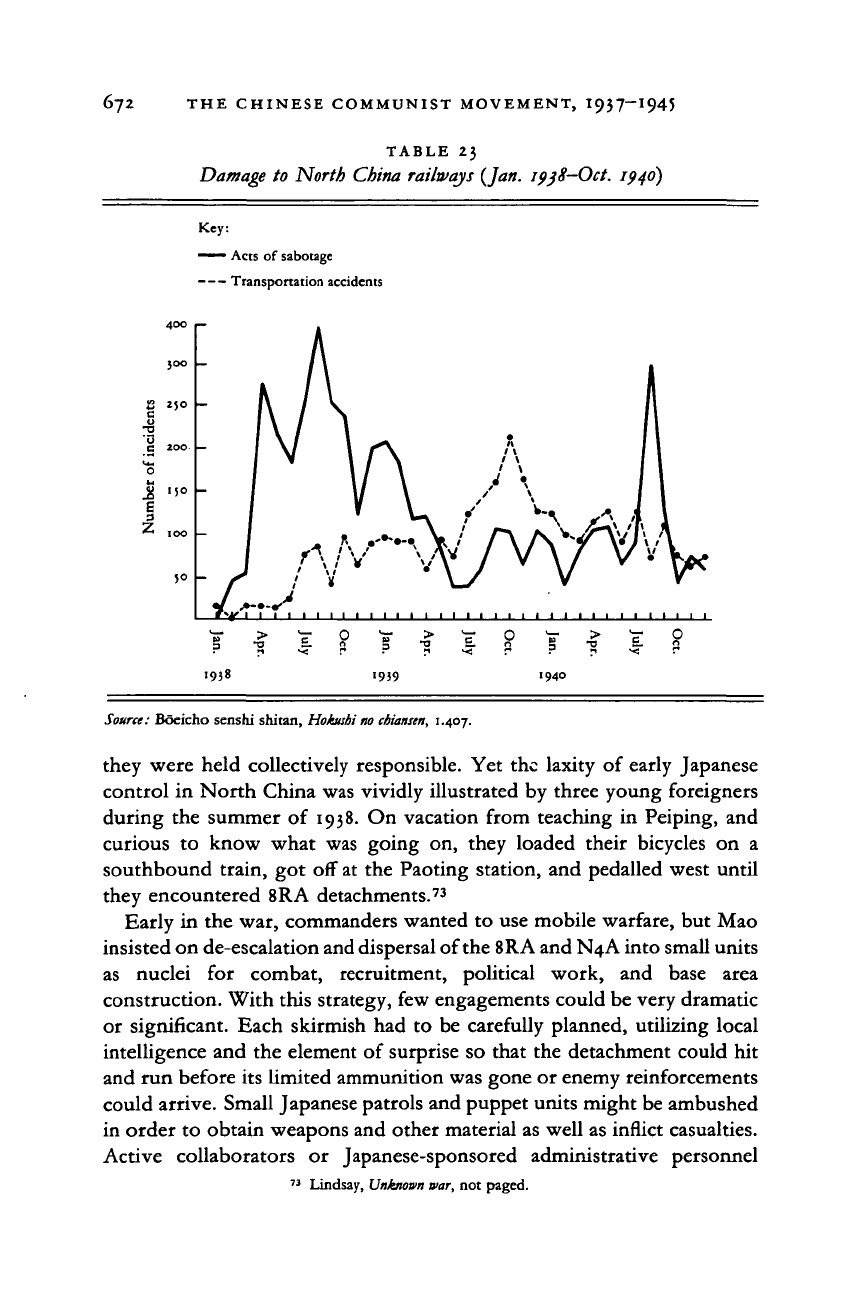
6
7
2
THE CHINESE COMMUNIST MOVEMENT, I937-I945
TABLE 23
Damage to North China railways {Jan. ipjS—Oct. 1940)
Key:
—"— Acts of sabotage
Transportation accidents
joo
<2 250
I
0
c 200-
E
Z ,00
50
Jan.
1938
Apr.
A
I
I 1
July
1
1 1
Oct.
1
1 1
Jan.
'939
1 1 1
Apr.
1 1 1
July
Oct.
Jan.
1940
Apr.
July
1 I 1 1
Oct.
Source: Boeicho senshi shitan, Hokuthi no cbianun, 1.407.
they were held collectively responsible. Yet the laxity of early Japanese
control in North China was vividly illustrated by three young foreigners
during the summer of 1938. On vacation from teaching in Peiping, and
curious to know what was going on, they loaded their bicycles on a
southbound train, got off at the Paoting station, and pedalled west until
they encountered 8RA detachments.
73
Early in the war, commanders wanted to use mobile warfare, but Mao
insisted on de-escalation and dispersal of the 8RA and N4A into small units
as nuclei for combat, recruitment, political work, and base area
construction. With this strategy, few engagements could be very dramatic
or significant. Each skirmish had to be carefully planned, utilizing local
intelligence and the element of surprise so that the detachment could hit
and run before its limited ammunition was gone or enemy reinforcements
could arrive. Small Japanese patrols and puppet units might be ambushed
in order to obtain weapons and other material as well as inflict casualties.
Active collaborators or Japanese-sponsored administrative personnel
73
Lindsay, Unknown war, not paged.
Cambridge Histories Online © Cambridge University Press, 2008
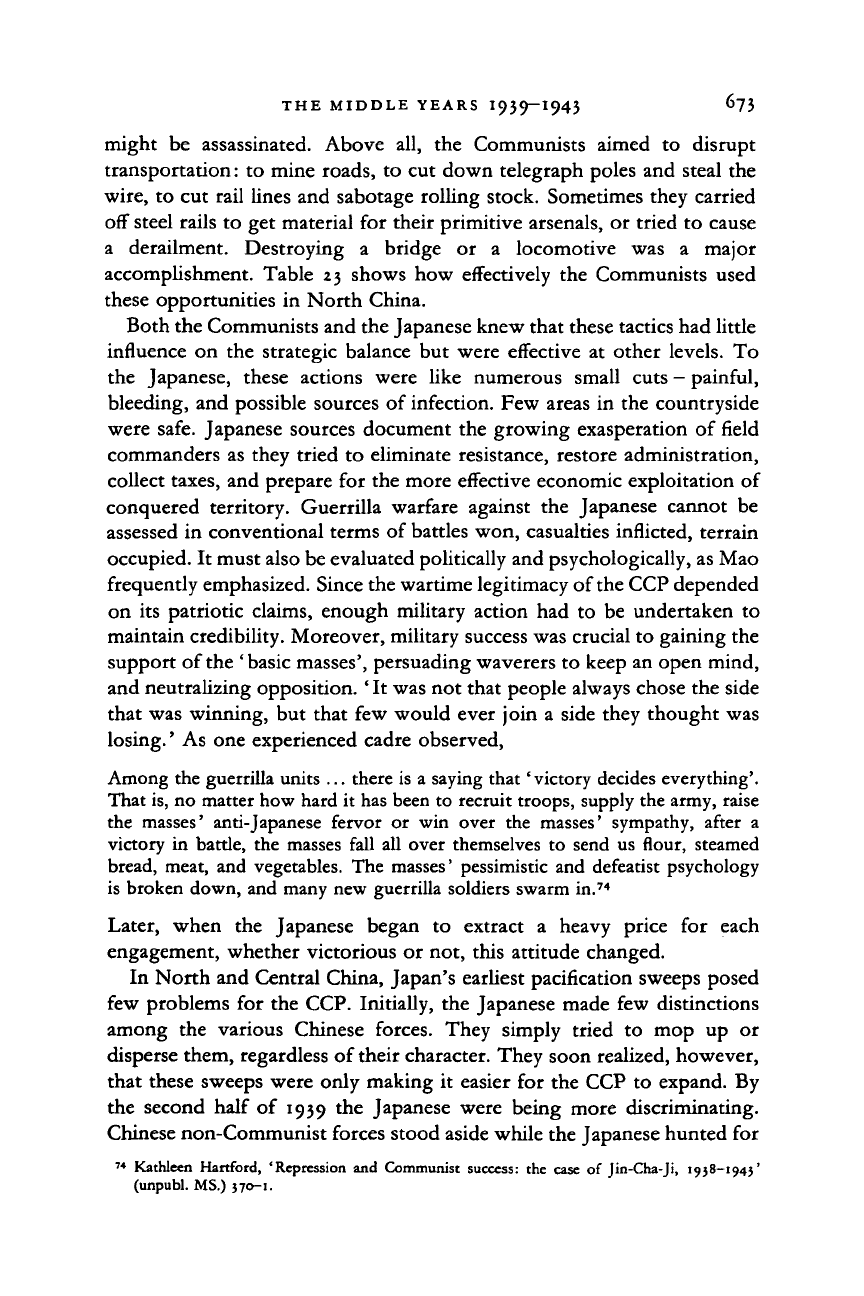
THE MIDDLE YEARS I939-I943 673
might be assassinated. Above all, the Communists aimed to disrupt
transportation: to mine roads, to cut down telegraph poles and steal the
wire,
to cut rail lines and sabotage rolling stock. Sometimes they carried
off steel rails to get material for their primitive arsenals, or tried to cause
a derailment. Destroying a bridge or a locomotive was a major
accomplishment. Table 23 shows how effectively the Communists used
these opportunities in North China.
Both the Communists and the Japanese knew that these tactics had little
influence on the strategic balance but were effective at other levels. To
the Japanese, these actions were like numerous small cuts - painful,
bleeding, and possible sources of infection. Few areas in the countryside
were safe. Japanese sources document the growing exasperation of field
commanders as they tried to eliminate resistance, restore administration,
collect taxes, and prepare for the more effective economic exploitation of
conquered territory. Guerrilla warfare against the Japanese cannot be
assessed in conventional terms of battles won, casualties inflicted, terrain
occupied. It must also be evaluated politically and psychologically, as Mao
frequently emphasized. Since the wartime legitimacy of the CCP depended
on its patriotic claims, enough military action had to be undertaken to
maintain credibility. Moreover, military success was crucial to gaining the
support of the ' basic masses', persuading waverers to keep an open mind,
and neutralizing opposition. ' It was not that people always chose the side
that was winning, but that few would ever join a side they thought was
losing.' As one experienced cadre observed,
Among the guerrilla units ... there is a saying that 'victory decides everything'.
That is, no matter how hard it has been to recruit troops, supply the army, raise
the masses' anti-Japanese fervor or win over the masses' sympathy, after a
victory in battle, the masses fall all over themselves to send us flour, steamed
bread, meat, and vegetables. The masses' pessimistic and defeatist psychology
is broken down, and many new guerrilla soldiers swarm in.
74
Later, when the Japanese began to extract a heavy price for each
engagement, whether victorious or not, this attitude changed.
In North and Central China, Japan's earliest pacification sweeps posed
few problems for the CCP. Initially, the Japanese made few distinctions
among the various Chinese forces. They simply tried to mop up or
disperse them, regardless of their character. They soon realized, however,
that these sweeps were only making it easier for the CCP to expand. By
the second half of 1939 the Japanese were being more discriminating.
Chinese non-Communist forces stood aside while the Japanese hunted for
74
Kathleen Hartford, 'Repression and Communist success: the case of Jin-Cha-Ji, 1938-1943'
(unpubl. MS.)
370-1.
Cambridge Histories Online © Cambridge University Press, 2008
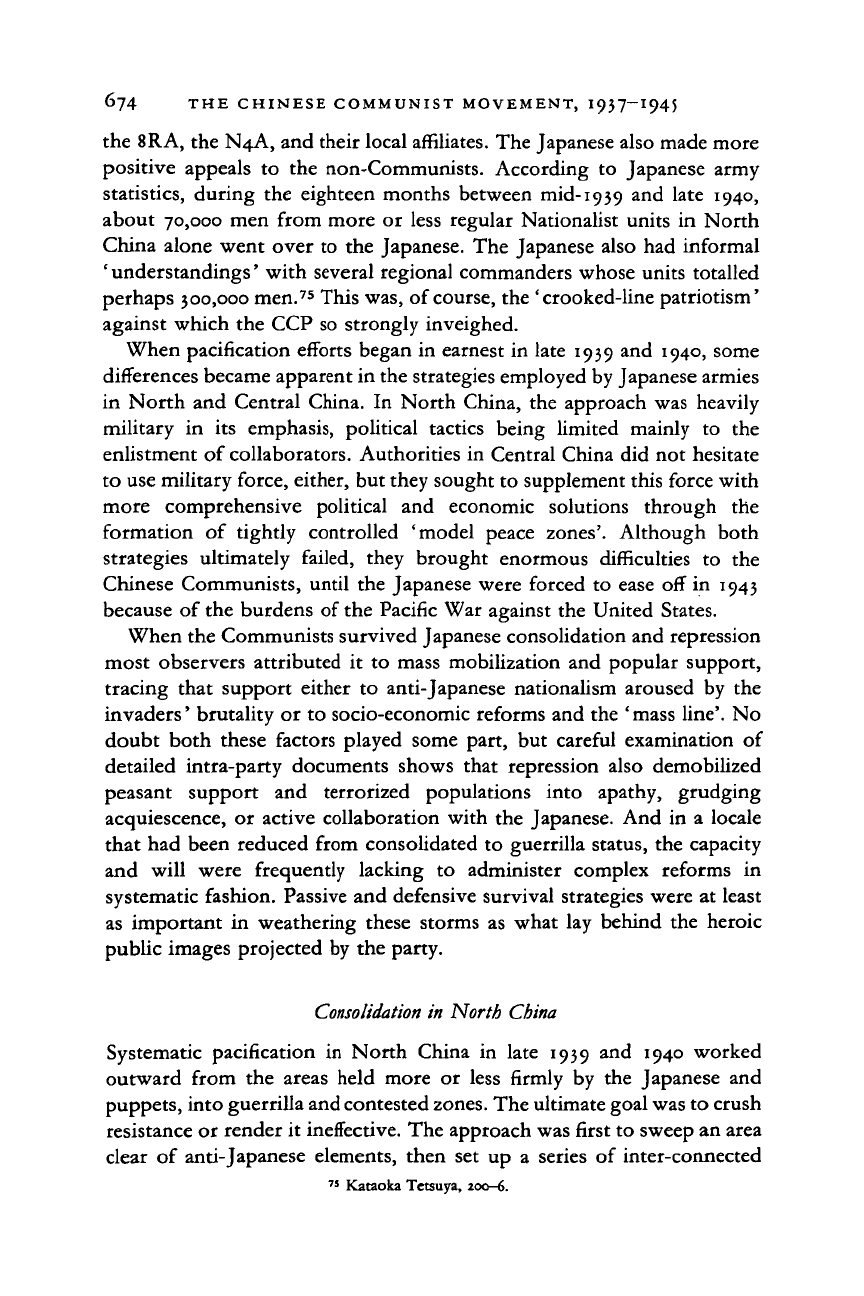
674 THE CHINESE COMMUNIST MOVEMENT, 1937— 1945
the 8RA, the N4A, and their local affiliates. The Japanese also made more
positive appeals to the non-Communists. According to Japanese army
statistics, during the eighteen months between mid-1939 and late 1940,
about 70,000 men from more or less regular Nationalist units in North
China alone went over to the Japanese. The Japanese also had informal
'understandings' with several regional commanders whose units totalled
perhaps 300,000 men.
75
This was, of
course,
the 'crooked-line patriotism'
against which the CCP so strongly inveighed.
When pacification efforts began in earnest in late 1939 and 1940, some
differences became apparent in the strategies employed by Japanese armies
in North and Central China. In North China, the approach was heavily
military in its emphasis, political tactics being limited mainly to the
enlistment of collaborators. Authorities in Central China did not hesitate
to use military force, either, but they sought to supplement this force with
more comprehensive political and economic solutions through the
formation of tightly controlled 'model peace zones'. Although both
strategies ultimately failed, they brought enormous difficulties to the
Chinese Communists, until the Japanese were forced to ease off in 1943
because of the burdens of the Pacific War against the United States.
When the Communists survived Japanese consolidation and repression
most observers attributed it to mass mobilization and popular support,
tracing that support either to anti-Japanese nationalism aroused by the
invaders' brutality or to socio-economic reforms and the 'mass line'. No
doubt both these factors played some part, but careful examination of
detailed intra-party documents shows that repression also demobilized
peasant support and terrorized populations into apathy, grudging
acquiescence, or active collaboration with the Japanese. And in a locale
that had been reduced from consolidated to guerrilla status, the capacity
and will were frequently lacking to administer complex reforms in
systematic fashion. Passive and defensive survival strategies were at least
as important in weathering these storms as what lay behind the heroic
public images projected by the party.
Consolidation
in North China
Systematic pacification in North China in late 1939 and 1940 worked
outward from the areas held more or less firmly by the Japanese and
puppets, into guerrilla and contested
zones.
The ultimate goal was to crush
resistance or render it ineffective. The approach was first to sweep an area
clear of anti-Japanese elements, then set up a series of inter-connected
75
Kataoka Tetsuya, 200-6.
Cambridge Histories Online © Cambridge University Press, 2008
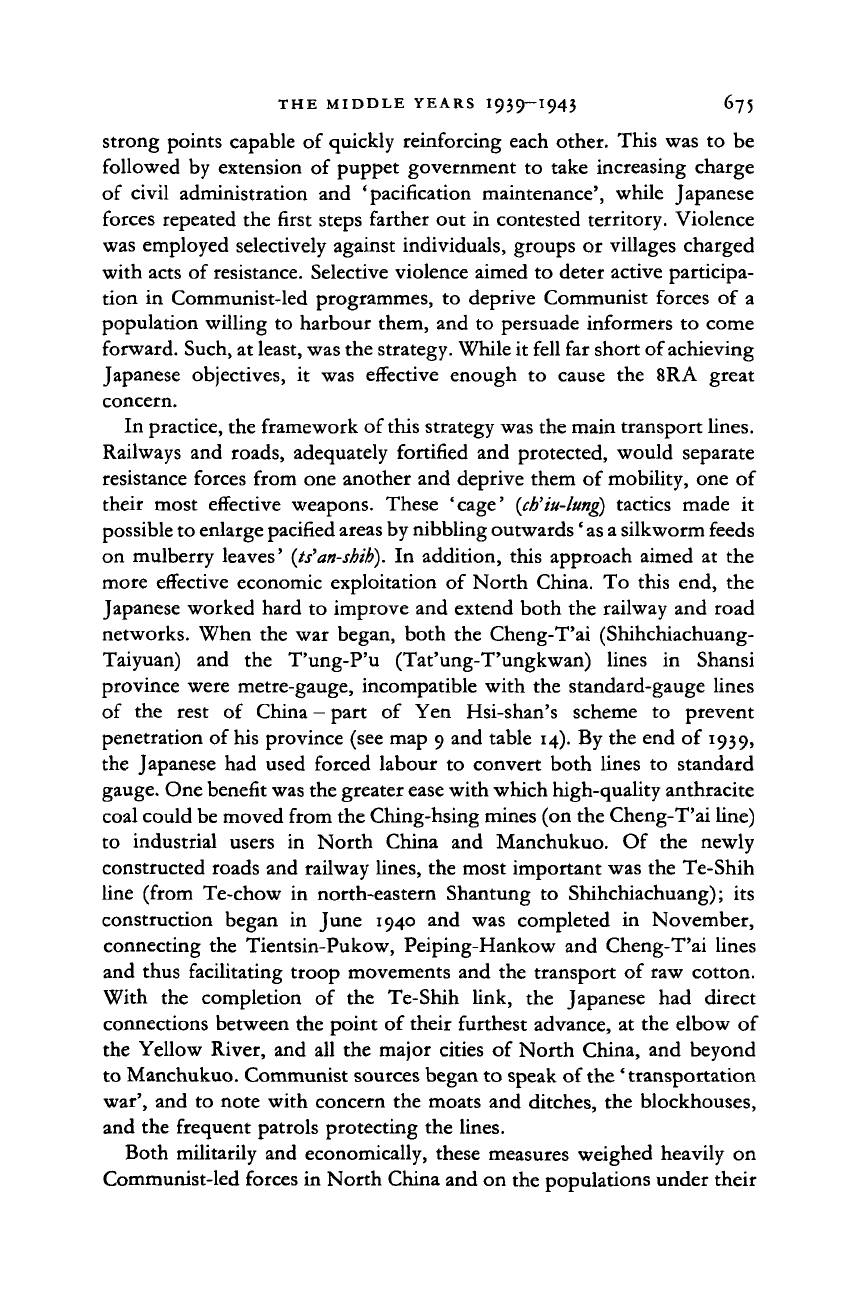
THE MIDDLE YEARS I939-I943 675
strong points capable of quickly reinforcing each other. This was to be
followed by extension of puppet government to take increasing charge
of civil administration and 'pacification maintenance', while Japanese
forces repeated the first steps farther out in contested territory. Violence
was employed selectively against individuals, groups or villages charged
with acts of resistance. Selective violence aimed to deter active participa-
tion in Communist-led programmes, to deprive Communist forces of a
population willing to harbour them, and to persuade informers to come
forward. Such, at least, was the strategy. While it fell far short of achieving
Japanese objectives, it was effective enough to cause the 8RA great
concern.
In practice, the framework of
this
strategy was the main transport lines.
Railways and roads, adequately fortified and protected, would separate
resistance forces from one another and deprive them of mobility, one of
their most effective weapons. These 'cage'
(ch'iu-lung)
tactics made it
possible to enlarge pacified areas by nibbling outwards 'as a silkworm feeds
on mulberry leaves'
(ts'an-shih).
In addition, this approach aimed at the
more effective economic exploitation of North China. To this end, the
Japanese worked hard to improve and extend both the railway and road
networks. When the war began, both the Cheng-T'ai (Shihchiachuang-
Taiyuan) and the T'ung-P'u (Tat'ung-T'ungkwan) lines in Shansi
province were metre-gauge, incompatible with the standard-gauge lines
of the rest of China - part of Yen Hsi-shan's scheme to prevent
penetration of his province (see map 9 and table 14). By the end of 1939,
the Japanese had used forced labour to convert both lines to standard
gauge. One benefit was the greater ease with which high-quality anthracite
coal could be moved from the Ching-hsing mines (on the Cheng-T'ai line)
to industrial users in North China and Manchukuo. Of the newly
constructed roads and railway lines, the most important was the Te-Shih
line (from Te-chow in north-eastern Shantung to Shihchiachuang); its
construction began in June 1940 and was completed in November,
connecting the Tientsin-Pukow, Peiping-Hankow and Cheng-T'ai lines
and thus facilitating troop movements and the transport of raw cotton.
With the completion of the Te-Shih link, the Japanese had direct
connections between the point of their furthest advance, at the elbow of
the Yellow River, and all the major cities of North China, and beyond
to Manchukuo. Communist sources began to speak of the ' transportation
war', and to note with concern the moats and ditches, the blockhouses,
and the frequent patrols protecting the lines.
Both militarily and economically, these measures weighed heavily on
Communist-led forces in North China and on the populations under their
Cambridge Histories Online © Cambridge University Press, 2008
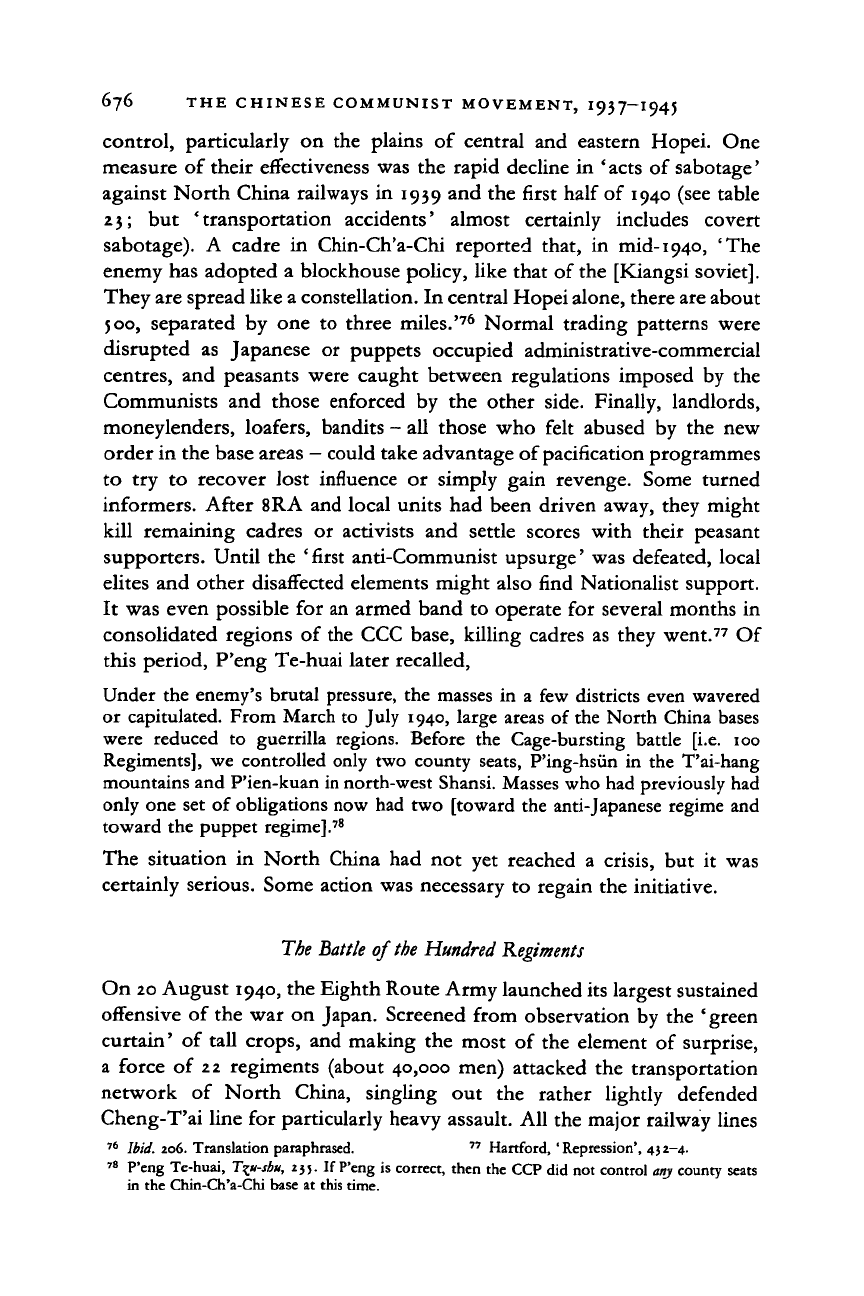
676 THE CHINESE COMMUNIST MOVEMENT, 1937—
control, particularly
on the
plains
of
central
and
eastern Hopei.
One
measure
of
their effectiveness was the rapid decline
in
'
acts
of
sabotage'
against North China railways
in
1939 and the first half
of
1940 (see table
2
3;
but
' transportation accidents' almost certainly includes covert
sabotage).
A
cadre
in
Chin-Ch'a-Chi reported that,
in
mid-1940,
'The
enemy has adopted
a
blockhouse policy, like that of the [Kiangsi soviet].
They are spread like a constellation. In central Hopei alone, there are about
500,
separated
by
one
to
three miles.'
76
Normal trading patterns were
disrupted
as
Japanese
or
puppets occupied administrative-commercial
centres, and peasants were caught between regulations imposed
by the
Communists
and
those enforced
by the
other side. Finally, landlords,
moneylenders, loafers, bandits
-
all those who felt abused
by the
new
order in the base areas
-
could take advantage of pacification programmes
to
try to
recover lost influence
or
simply gain revenge. Some turned
informers. After 8RA and local units had been driven away, they might
kill remaining cadres
or
activists
and
settle scores with their peasant
supporters. Until the 'first anti-Communist upsurge' was defeated, local
elites and other disaffected elements might also find Nationalist support.
It was even possible for an armed band to operate for several months
in
consolidated regions
of
the CCC base, killing cadres
as
they went.
77
Of
this period, P'eng Te-huai later recalled,
Under the enemy's brutal pressure, the masses
in a
few districts even wavered
or capitulated. From March to July 1940, large areas of the North China bases
were reduced
to
guerrilla regions. Before
the
Cage-bursting battle [i.e.
100
Regiments],
we controlled only two county seats, P'ing-hsiin
in
the T'ai-hang
mountains and P'ien-kuan in north-west Shansi. Masses who had previously had
only one set of obligations now had two [toward the anti-Japanese regime and
toward the puppet regime].'
8
The situation
in
North China had
not yet
reached
a
crisis,
but it
was
certainly serious. Some action was necessary
to
regain the initiative.
The Battle of
the
Hundred Regiments
On 20 August 1940, the Eighth Route Army launched its largest sustained
offensive
of
the war on Japan. Screened from observation by the ' green
curtain'
of
tall crops, and making the most
of
the element
of
surprise,
a force
of
22 regiments (about 40,000 men) attacked the transportation
network
of
North China, singling
out the
rather lightly defended
Cheng-T'ai line for particularly heavy assault. All the major railway lines
76
Ibid.
206. Translation paraphrased.
"
Hartford, ' Repression',
43
2-4.
78
P'eng Te-huai, T^u-sbu, 235.
If
P'eng
is
correct, then the CCP did not control
any
county seats
in the Chin-Ch'a-Chi base
at
this time.
Cambridge Histories Online © Cambridge University Press, 2008
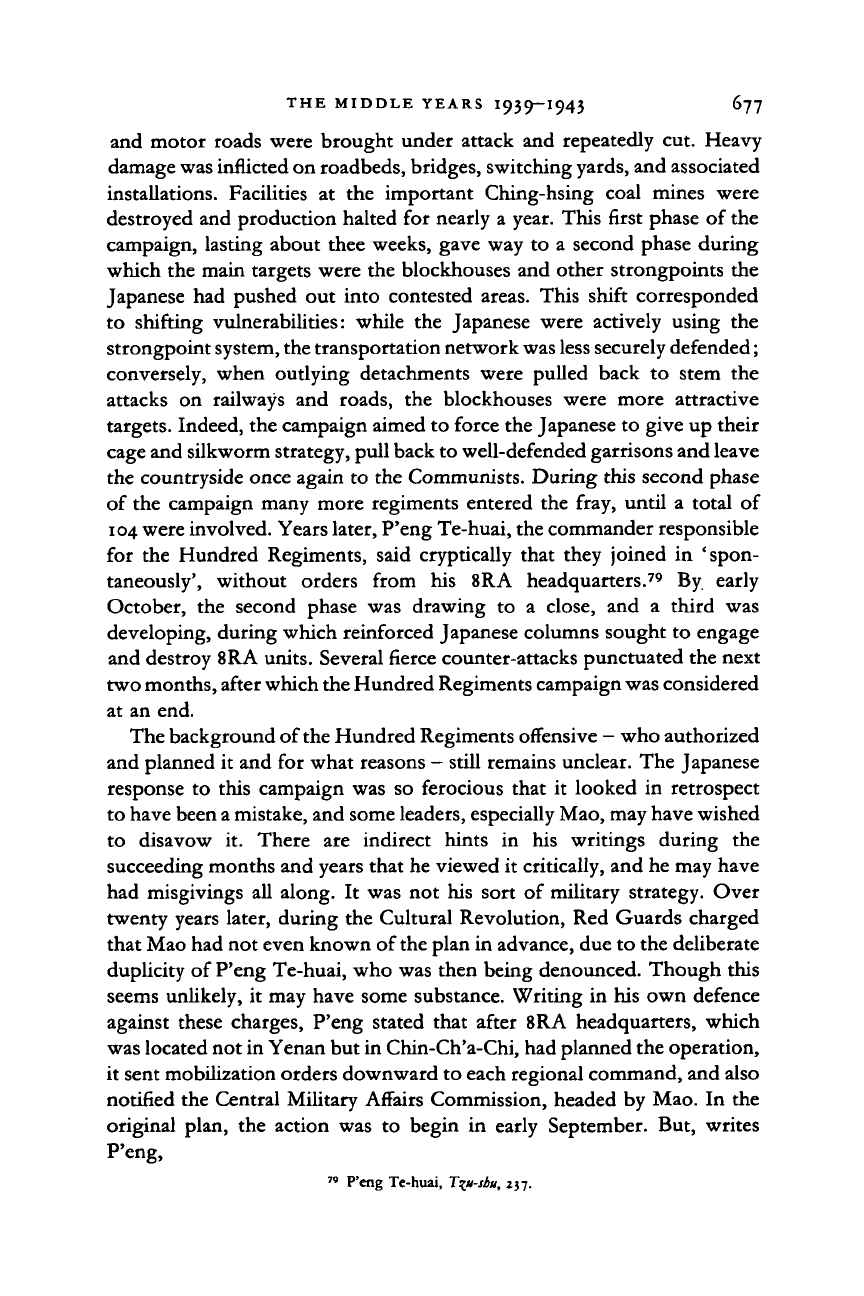
THE MIDDLE YEARS I939-I943 677
and motor roads were brought under attack and repeatedly cut. Heavy
damage was inflicted on roadbeds, bridges, switching yards, and associated
installations. Facilities at the important Ching-hsing coal mines were
destroyed and production halted for nearly a year. This first phase of the
campaign, lasting about thee weeks, gave way to a second phase during
which the main targets were the blockhouses and other strongpoints the
Japanese had pushed out into contested areas. This shift corresponded
to shifting vulnerabilities: while the Japanese were actively using the
strongpoint system, the transportation network
was
less securely defended;
conversely, when outlying detachments were pulled back to stem the
attacks on railways and roads, the blockhouses were more attractive
targets. Indeed, the campaign aimed to force the Japanese to give up their
cage and silkworm strategy, pull back to well-defended garrisons and leave
the countryside once again to the Communists. During this second phase
of the campaign many more regiments entered the fray, until a total of
104
were involved. Years later, P'eng Te-huai, the commander responsible
for the Hundred Regiments, said cryptically that they joined in 'spon-
taneously', without orders from his 8RA headquarters.
79
By early
October, the second phase was drawing to a close, and a third was
developing, during which reinforced Japanese columns sought to engage
and destroy 8RA units. Several fierce counter-attacks punctuated the next
two months, after which the Hundred Regiments campaign was considered
at an end.
The background of the Hundred Regiments offensive - who authorized
and planned it and for what reasons - still remains unclear. The Japanese
response to this campaign was so ferocious that it looked in retrospect
to have been a mistake, and some leaders, especially Mao, may have wished
to disavow it. There are indirect hints in his writings during the
succeeding months and years that he viewed it critically, and he may have
had misgivings all along. It was not his sort of military strategy. Over
twenty years later, during the Cultural Revolution, Red Guards charged
that Mao had not even known of
the
plan in advance, due to the deliberate
duplicity of P'eng Te-huai, who was then being denounced. Though this
seems unlikely, it may have some substance. Writing in his own defence
against these charges, P'eng stated that after 8RA headquarters, which
was located not in Yenan but in Chin-Ch'a-Chi, had planned the operation,
it sent mobilization orders downward to each regional command, and also
notified the Central Military Affairs Commission, headed by Mao. In the
original plan, the action was to begin in early September. But, writes
P'eng,
™ P'eng Te-huai, T^u-sbu, 237.
Cambridge Histories Online © Cambridge University Press, 2008
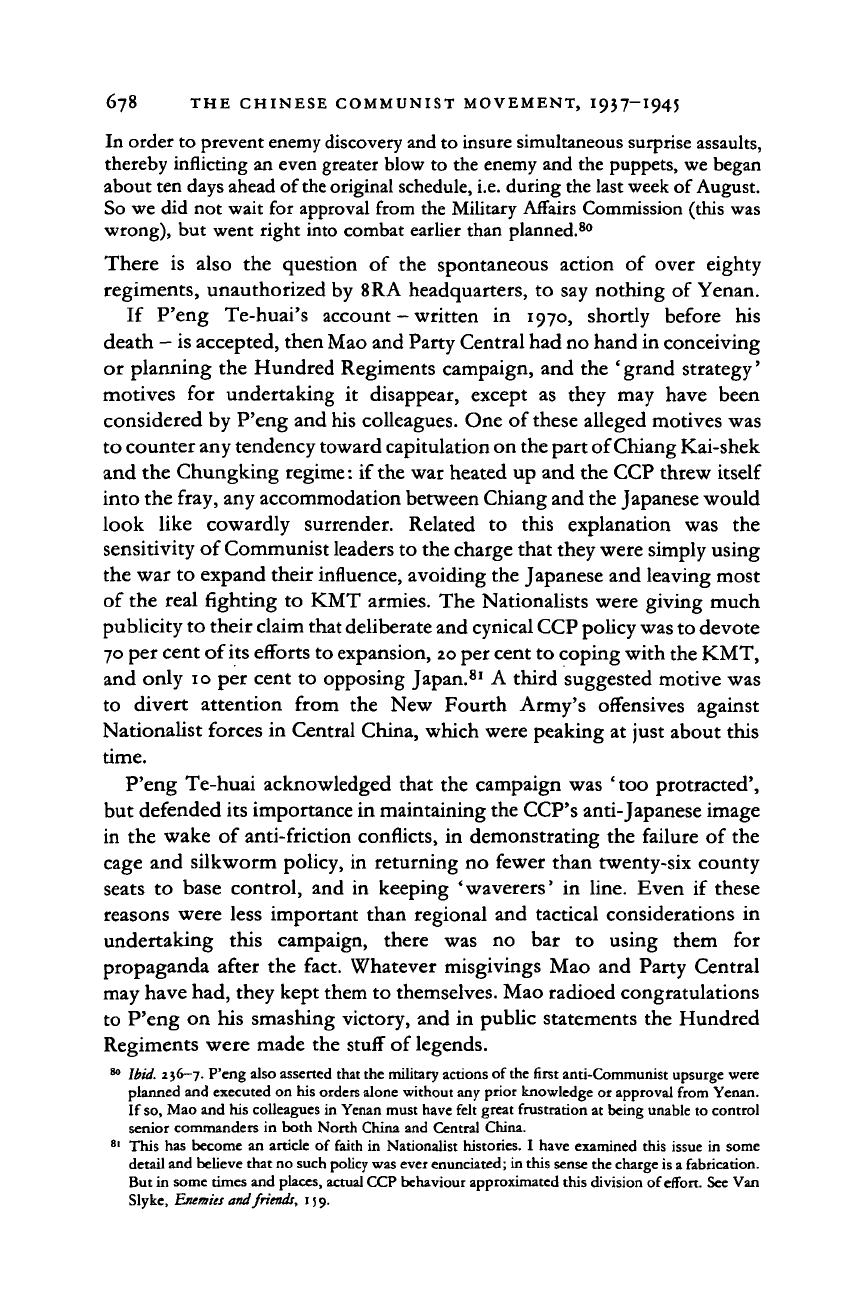
678 THE CHINESE COMMUNIST MOVEMENT,
1937—
1945
In order to prevent enemy discovery and to insure simultaneous surprise assaults,
thereby inflicting an even greater blow to the enemy and the puppets, we began
about ten days ahead of
the
original schedule, i.e. during the last week of August.
So we did not wait for approval from the Military Affairs Commission (this was
wrong), but went right into combat earlier than planned.
80
There is also the question of the spontaneous action of over eighty
regiments, unauthorized by 8RA headquarters, to say nothing of Yenan.
If P'eng Te-huai's account - written in 1970, shortly before his
death - is accepted, then Mao and Party Central had no hand in conceiving
or planning the Hundred Regiments campaign, and the ' grand strategy'
motives for undertaking it disappear, except as they may have been
considered by P'eng and his colleagues. One of these alleged motives was
to counter any tendency toward capitulation on the part of Chiang Kai-shek
and the Chungking regime: if the war heated up and the CCP threw itself
into the fray, any accommodation between Chiang and the Japanese would
look like cowardly surrender. Related to this explanation was the
sensitivity of Communist leaders to the charge that they were simply using
the war to expand their influence, avoiding the Japanese and leaving most
of the real fighting to KMT armies. The Nationalists were giving much
publicity to their claim that deliberate and cynical CCP policy was to devote
70 per cent of its efforts to expansion,
20
per cent to coping with the KMT,
and only 10 per cent to opposing Japan.
81
A third suggested motive was
to divert attention from the New Fourth Army's offensives against
Nationalist forces in Central China, which were peaking at just about this
time.
P'eng Te-huai acknowledged that the campaign was 'too protracted',
but defended its importance in maintaining the CCP's anti-Japanese image
in the wake of anti-friction conflicts, in demonstrating the failure of the
cage and silkworm policy, in returning no fewer than twenty-six county
seats to base control, and in keeping 'waverers' in line. Even if these
reasons were less important than regional and tactical considerations in
undertaking this campaign, there was no bar to using them for
propaganda after the fact. Whatever misgivings Mao and Party Central
may have had, they kept them to themselves. Mao radioed congratulations
to P'eng on his smashing victory, and in public statements the Hundred
Regiments were made the stuff of legends.
80
Ibid.
256—7.
P'eng also asserted that the military actions of the first anti-Communist upsurge were
planned and executed on his orders alone without any prior knowledge or approval from Yenan.
If
so,
Mao and his colleagues in Yenan must have felt great frustration at being unable to control
senior commanders in both North China and Central China.
81
This has become an article of faith in Nationalist histories. I have examined this issue in some
detail and believe that no such policy was ever enunciated; in this sense the charge is a fabrication.
But in some times and places, actual CCP behaviour approximated this division of effort. See Van
Slyke, Enemies and friends, 159.
Cambridge Histories Online © Cambridge University Press, 2008
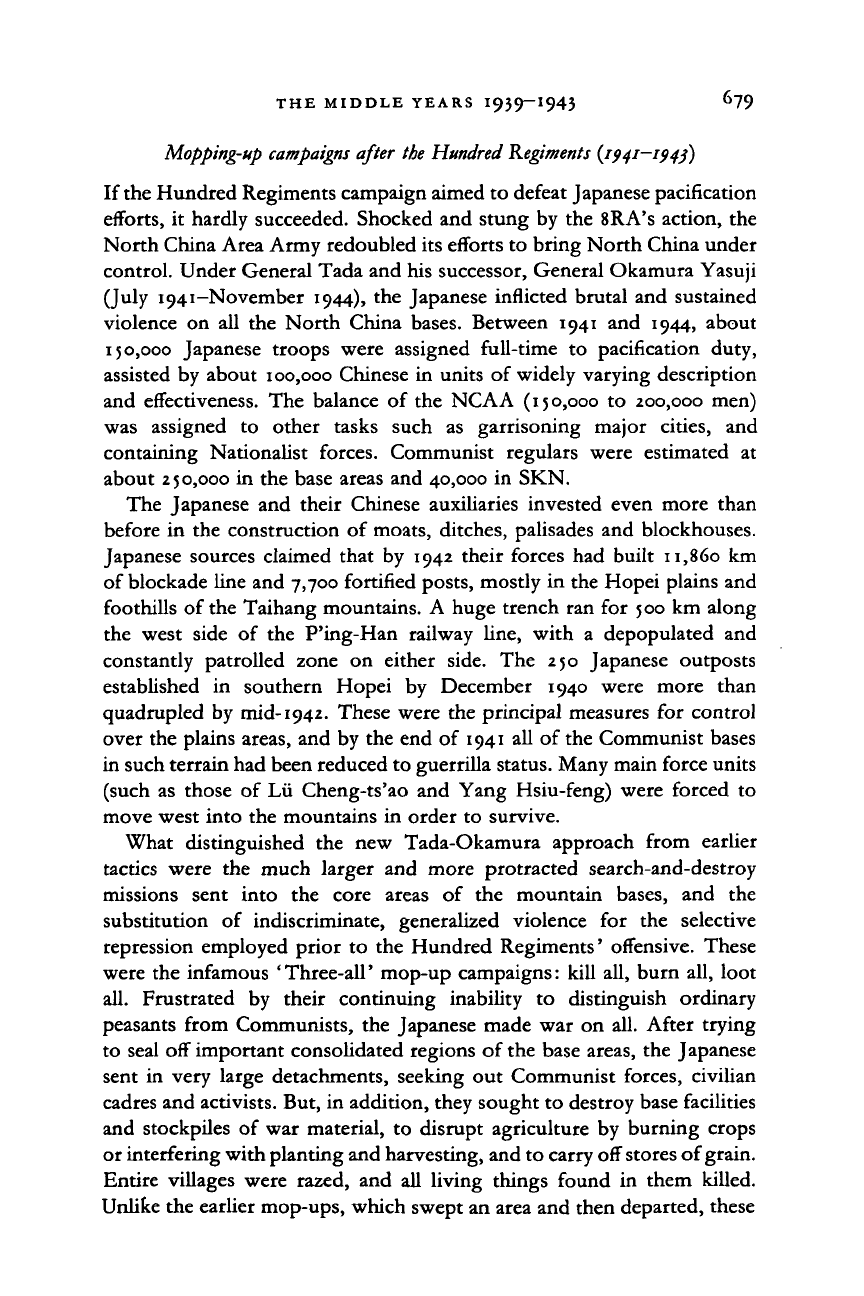
THE MIDDLE YEARS 1939-1943
Mopping-up
campaigns
after the Hundred Regiments (1941-1943)
If the Hundred Regiments campaign aimed to defeat Japanese pacification
efforts, it hardly succeeded. Shocked and stung by the 8RA's action, the
North China Area Army redoubled its efforts to bring North China under
control. Under General Tada and his successor, General Okamura Yasuji
(July 1941-November 1944), the Japanese inflicted brutal and sustained
violence on all the North China bases. Between 1941 and 1944, about
150,000 Japanese troops were assigned full-time to pacification duty,
assisted by about 100,000 Chinese in units of widely varying description
and effectiveness. The balance of the NCAA (150,000 to 200,000 men)
was assigned to other tasks such as garrisoning major cities, and
containing Nationalist forces. Communist regulars were estimated at
about 250,000 in the base areas and 40,000 in SKN.
The Japanese and their Chinese auxiliaries invested even more than
before in the construction of moats, ditches, palisades and blockhouses.
Japanese sources claimed that by 1942 their forces had built 11,860 km
of blockade line and 7,700 fortified posts, mostly in the Hopei plains and
foothills of the Taihang mountains. A huge trench ran for 500 km along
the west side of the P'ing-Han railway line, with a depopulated and
constantly patrolled zone on either side. The 250 Japanese outposts
established in southern Hopei by December 1940 were more than
quadrupled by mid-1942. These were the principal measures for control
over the plains areas, and by the end of 1941 all of the Communist bases
in such terrain had been reduced to guerrilla status. Many main force units
(such as those of Lii Cheng-ts'ao and Yang Hsiu-feng) were forced to
move west into the mountains in order to survive.
What distinguished the new Tada-Okamura approach from earlier
tactics were the much larger and more protracted search-and-destroy
missions sent into the core areas of the mountain bases, and the
substitution of indiscriminate, generalized violence for the selective
repression employed prior to the Hundred Regiments' offensive. These
were the infamous 'Three-all' mop-up campaigns: kill all, burn all, loot
all.
Frustrated by their continuing inability to distinguish ordinary
peasants from Communists, the Japanese made war on all. After trying
to seal off important consolidated regions of the base areas, the Japanese
sent in very large detachments, seeking out Communist forces, civilian
cadres and activists. But, in addition, they sought to destroy base facilities
and stockpiles of war material, to disrupt agriculture by burning crops
or interfering with planting and harvesting, and to carry off stores of grain.
Entire villages were razed, and all living things found in them killed.
Unlike the earlier mop-ups, which swept an area and then departed, these
Cambridge Histories Online © Cambridge University Press, 2008
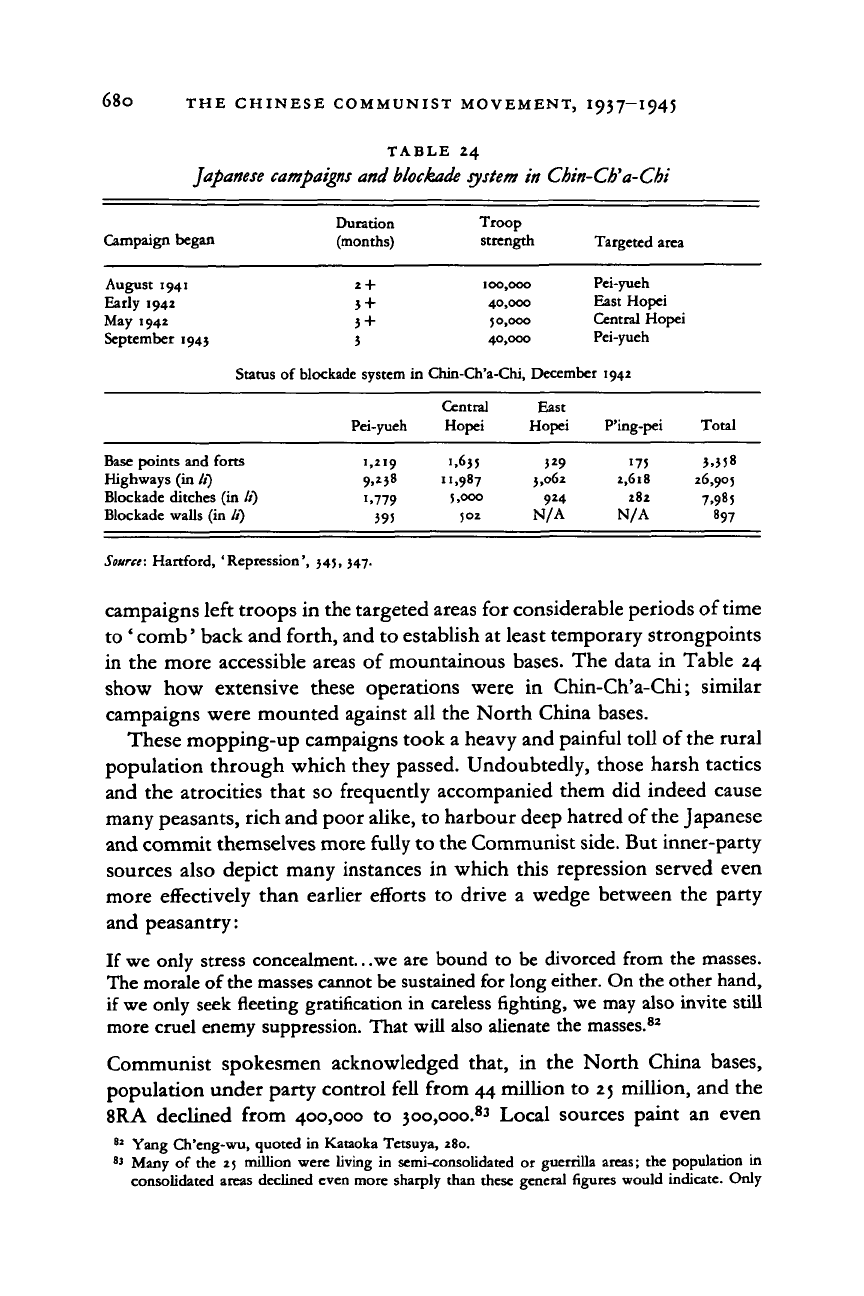
680 THE CHINESE COMMUNIST MOVEMENT, I937-1945
TABLE 24
Japanese
campaigns
and
blockade
system in Cbin-Ch'a-Chi
Duration Troop
Campaign began (months) strength Targeted area
August 1941
Early 1942
May 1942
September 194;
2 +
3
+
5
+
3
100,000
40,000
50,000
40,000
Pei-yueh
East Hopei
Central Hopei
Pei-yueh
Status
Base points and forts
Highways (in //)
Blockade ditches (in //)
Blockade walls (in //)
of blockade system in
Pei-yueh
1,219
9.*38
J.779
395
Chin-Ch'a-Chi,
Central
Hopei
•.635
11,987
5,000
502
December
East
Hopei
3*9
3,062
924
N/A
1942
P'ing-pei
175
2,618
282
N/A
Total
5.558
26,90;
7.985
897
Source:
Hartford, 'Repression', 345, 347.
campaigns left troops in the targeted areas for considerable periods of time
to ' comb' back and forth, and to establish at least temporary strongpoints
in the more accessible areas of mountainous bases. The data in Table 24
show how extensive these operations were in Chin-Ch'a-Chi; similar
campaigns were mounted against all the North China bases.
These mopping-up campaigns took a heavy and painful toll of the rural
population through which they passed. Undoubtedly, those harsh tactics
and the atrocities that so frequently accompanied them did indeed cause
many peasants, rich and poor alike, to harbour deep hatred of the Japanese
and commit themselves more fully to the Communist
side.
But inner-party
sources also depict many instances in which this repression served even
more effectively than earlier efforts to drive a wedge between the party
and peasantry:
If we only stress concealment.. .we are bound to be divorced from the masses.
The morale of the masses cannot be sustained for long either. On the other hand,
if
we
only seek
fleeting
gratification in careless righting, we may also invite still
more cruel enemy suppression. That will also alienate the masses.
82
Communist spokesmen acknowledged that, in the North China bases,
population under party control fell from 44 million to 25 million, and the
8RA declined from 400,000 to 3oo,ooo.
83
Local sources paint an even
82
Yang Ch'eng-wu, quoted
in
Kataoka Tetsuya,
280.
83
Many
of the 25
million were living
in
semi-consolidated
or
guerrilla areas;
the
population
in
consolidated areas declined even more sharply than these general figures would indicate. Only
Cambridge Histories Online © Cambridge University Press, 2008
